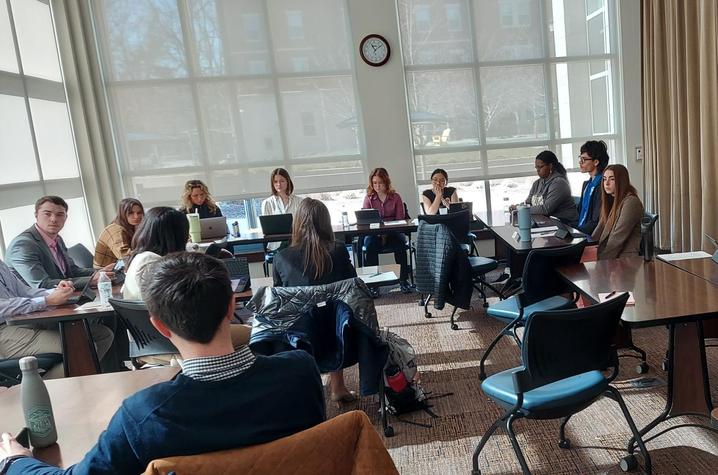Lewis Honors College, Patterson School simulation gives students in-depth knowledge of US-China relations
LEXINGTON, Ky. (March 10, 2023) — To reinforce classroom learning of the Asia: The Next Theater of Great Power Politics course, University of Kentucky Lewis Honors College lecturer Nazmus Sakib held a simulation of the U.S. President’s National Security Council on “Restarting Bilateral Nuclear Dialogue Between the U.S. and China" on campus this past weekend. The simulation participants emphasized U.N.-moderated dialogue between the U.S. and China. In addition to strengthening trust between the two nations, students also focused on reducing the threat of nuclear escalation, green energy and cultural exchange.
One of the primary objectives of the simulation was to strengthen student awareness of the role nuclear weapons play in global security and power structures.
"I did not realize before how difficult it will be to come to a solution with the U.S.-China nuclear relations. There are so many things to disagree on; there is no easy answer to so many questions," said Clark Mattox, a Lewis Honors student majoring in environmental and sustainability studies.
The simulation also helped enhance their understanding of different perspectives and frameworks in international relations.
"Having everyone take on a specific role, with their own motives and goals, made me realize how many different perspectives there are and how they are not necessarily wrong, but they just have different objectives to achieve," said Sarah McClellan, a Lewis Honors student majoring in political science.
The students acted as members of the president's National Security Council, learning to apply international relationship concepts to practical situations.
"I did not know how tedious the policymaking process can be with the interaction of so many different departments. It changed my views on how tedious the policymaking world can be," said Michaela Findley, a Lewis Honors student majoring in political science. "Personally, I was not knowledgeable about the issues before. It was nice to have a clear understanding by working with others who knew more. I feel like I can now sit down and have a conversation with someone about it. That was nice."
Patterson School of Diplomacy and International Commerce Associate Professor Gregory Hall co-moderated the event. As a member of the U.S. Secretary of State’s International Security Advisory Board, Hall was honored to utilize his expertise to introduce a deeper understanding of the complexities of international diplomacy.
"I was impressed with the level of engagement displayed by the honors students throughout the simulation, especially given their diverse background," Hall said.
A group of graduate Patterson School students — Sarahi Castillo, Kayden Jenson and William Lucht — assisted with the simulation.
The Lewis Honors College and the Patterson School of Diplomacy and Commerce are already planning to organize similar events in the future to provide students with more opportunities to apply their knowledge in practical situations.
Daisy Alliance, a nonprofit organization that works to reframe public discourse on nuclear weapons by emphasizing the humanitarian consequences of nuclear war, partnered on this event.
***
The University of Kentucky Lewis Honors College provides an alternative course of instruction for outstanding, highly motivated students from all programs of study. Honors students are diverse, innovative, intellectually engaged and interested in creative thought. Lewis Honors students are expected to be citizens of their university and their world, and to possess an inquisitive attitude toward a wide range of ideas and intellectual concepts.
With a tradition of leadership and innovation, and a commitment to excellence, the University of Kentucky Patterson School of Diplomacy and International Commerce is keenly focused on what will be required to prepare international policymakers to meet the demands of the 21st century. The program is guided by James Patterson’s visionary approach to the integrated study of diplomacy and international commerce.
As the state’s flagship, land-grant institution, the University of Kentucky exists to advance the Commonwealth. We do that by preparing the next generation of leaders — placing students at the heart of everything we do — and transforming the lives of Kentuckians through education, research and creative work, service and health care. We pride ourselves on being a catalyst for breakthroughs and a force for healing, a place where ingenuity unfolds. It's all made possible by our people — visionaries, disruptors and pioneers — who make up 200 academic programs, a $476.5 million research and development enterprise and a world-class medical center, all on one campus.





